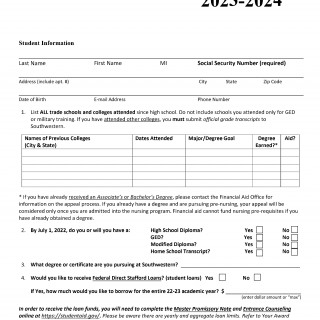Supplemental Information Form
The Supplemental Information Form is a required document for some colleges and universities during the application process. The main purpose of this form is to gather additional information about the applicant beyond what is included in the standard application form.
The form consists of various parts where applicants can provide detailed information about their extracurricular activities, leadership positions, volunteer work, employment history, interests, goals, and reasons for applying to the college or university. It is important to follow the instructions provided with the form, as some colleges may have specific guidelines for filling it out, such as word limits or formatting instructions.
The Supplemental Information Form typically asks for information such as extracurricular activities, leadership positions held, volunteer work, employment history, and any other relevant experiences or achievements. The form may also ask for information about the applicant's interests, goals, and reasons for applying to the college or university.
It is important to carefully read and follow the instructions provided with the Supplemental Information Form. Some colleges may have specific requirements or guidelines for filling out the form, such as word limits or formatting instructions.
The information provided on the Supplemental Information Form can be used by the admissions committee to gain a more complete picture of the applicant and their qualifications. It is important to be honest and thorough when filling out this form, as it can have an impact on the admissions decision.
If you are required to submit a Supplemental Information Form, be sure to complete it to the best of your ability and submit it along with the rest of your application materials by the specified deadline.
The parties involved in the Supplemental Information Form are the applicant and the admissions committee. The information provided on the form can be used by the committee to gain a more complete picture of the applicant and their qualifications. It is important to be honest and thorough when filling out this form, as it can have an impact on the admissions decision.
When compiling the form, applicants will need to provide detailed information about their experiences, achievements, and goals. Some colleges may also require applicants to attach additional documents, such as resumes or writing samples.
An example of a practice use case for the Supplemental Information Form is a student who has a strong interest in a specific extracurricular activity or academic subject. They can use the form to provide additional information about their involvement in that activity or subject, which may help them stand out to the admissions committee.
One strength of the Supplemental Information Form is that it allows applicants to provide a more complete picture of their qualifications and experiences. However, a weakness is that completing the form can be time-consuming and may require additional effort beyond the standard application.
There are no direct related or alternative forms to the Supplemental Information Form, as it is unique to each college or university that requires it. However, some colleges may have similar forms or essay prompts that ask for additional information beyond the standard application.
The Supplemental Information Form can have a significant impact on the future of the applicant, as it can provide a more complete picture of their qualifications to the admissions committee. It is important to complete the form to the best of one's ability and submit it along with the rest of the application materials by the specified deadline.
The Supplemental Information Form is typically submitted along with the rest of the application materials through the college or university's online application portal. Once submitted, the form and other application materials are stored securely by the college or university's admissions office.

